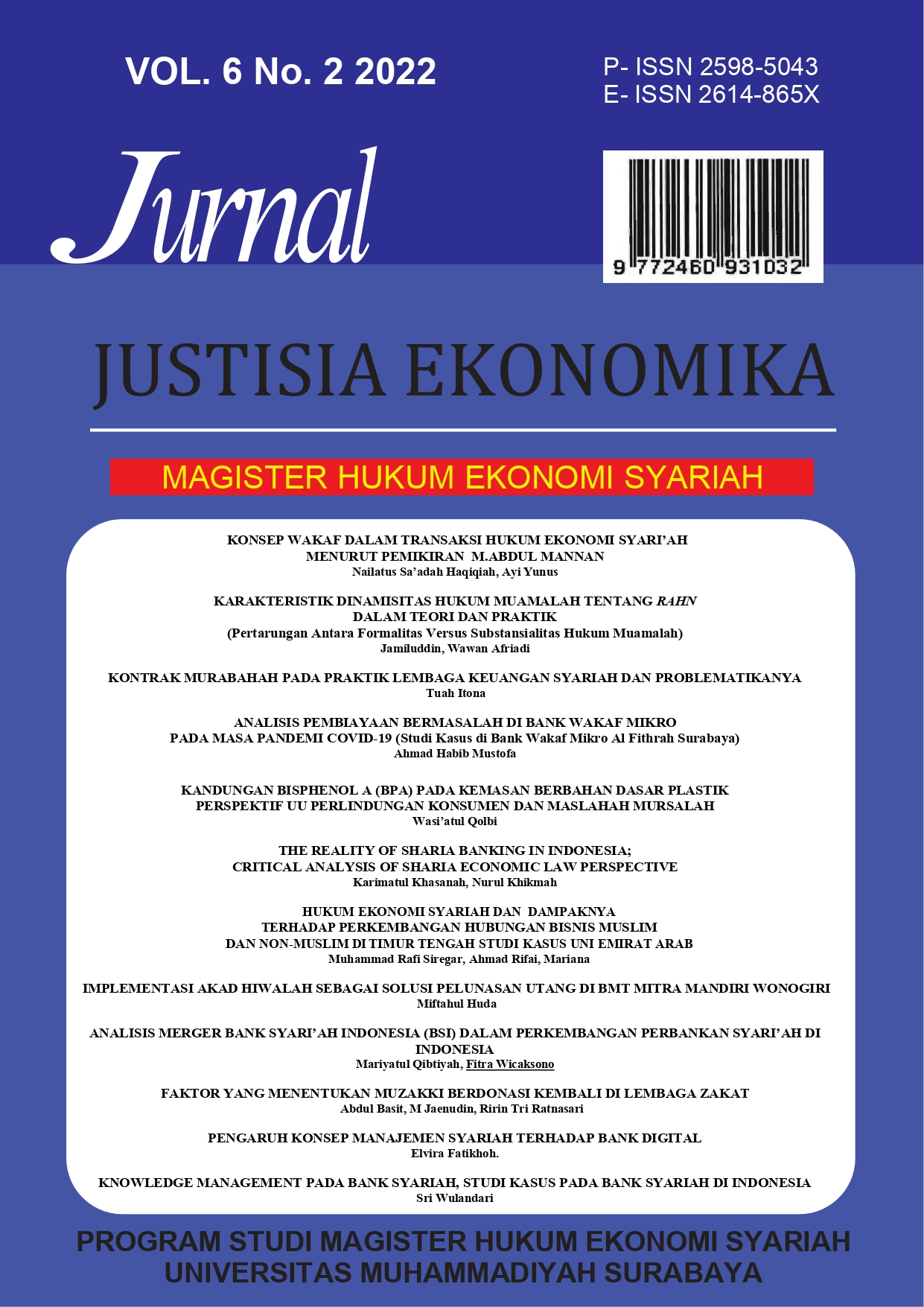KONSEP WAKAF DALAM TRANSAKSI HUKUM EKONOMI SYARI’AH MENURUT PEMIKIRAN M.ABDUL MANNAN
DOI:
https://doi.org/10.30651/justeko.v6i2.14338Abstrak
ÂM. Abdul Mannan is a Muslim thinker who was born in 1938, he is one of the economic thinkers in the contemporary era. His intelligence in criticizing the thoughts of various economic figures associated with Islamic law such as waqf, determines the basic economic function, which consists of consumption, production and distribution. As a scientist and academic, one of his most popular works is Islamic Economics: Theory and Practice. So from his prowess in economic thought, this paper will describe some of M.Abdul Mannan's thoughts related to economic problems, especially in the field of waqf transactions. This writing uses a descriptive method using library research, namely literature review from several book sources as well as other scientific journals. Through this paper, it can be seen some of the thoughts of M. Abdul Mannan. The conclusions drawn from this paper are the basic economic function applied by Abdul Mannan based on Islamic law which rejects antisocial and there are several operational steps, and the waqf sector Abdul Mannan said that cash waqf is better to involve Islamic banks as organizers because it is felt to managed in a transparent and accountable manner
Referensi
Abdul Qoyum ,Asep Nurhalim, Fithriady, Martini, dkk., 2021. Sejarah Pemikiran Ekonomi Islam. Jakarta: Derpartemen Ekonomi dan Keuangan Syariah-BI.
Anshor, Abdul Ghofur., 2005. Hukum dan Praktik Perwakilan Wakaf di Indonesia. Yogyakarta: Pilar Media.
Aravik, Havis., 2014. Sejarah Pemikiran Ekonomi Islam Kontemporer. Depok: Kencana Prenada Media Group
Azhasyah Ibrahim, dkk., 2021. Pengantar Ekonomi Islam. jakarta: Departemen Ekonomi dan Keuangan Syariah-BI.
Beik, Irfan Syauqi., 2006. Wakaf Tunai dan Pengentasan Kemiskinan. ICMC Online, Halal Guide.
Dahlawi., 2019. Implementasi Zakat Sebagai Pendapatan Asli Daerah vol 5. Al-Ijtima'i International Journal Of Goverment and Social Science, 24.
Farid, Hilya El Akhwalik Rizkia., 2021. Konsep Wakaf Tunai Menurut Muhamad Abdul Mannan dan Mundzir Qahaf dan Relevansinya dengan Cash Waqf Linked Sukuk. IAIN kediri.
Haneef, M. A., 1995. Contempary Islamic Economic Thought: a selected comparative Analysis. Iqrar: Selangor.
Haq, A. Faishal., 2012. Wakaf Kontemporer Dari Teoti Ke Aplikasi.
Imtina, Qori., 2021. Pemikiran Ekonomi Islam Oleh Muhammad Abdul Mannan : Teori Produksi (Madzhab Mainstream). Jurnal Ilmiah ISlam , 2.
Janwari, Yadi., 2016. Pemikiran Ekonomi Islam. Bandung: PT Remaja Rosdakarya.
Mannan, Muhammad Abdul., 1970. Islamic Economics: Theory and Practice. Delhi: M Asharaf.
Mannan, Muhammad Abdul., 2000. Sertifikat Wakaf Tunai: Sebuah Inovasi Instrumen Keuangan Islam, Terjemahan Agus Mijanto dan Rozi Diyanti. Depok: Ciber PKTTI-UI.
Mannan, Muhammad Abdul., 2018. Linking Islamic and Social Finance with special reference to cash-waqf as new strategy of interest fee micro credit for family empowerment of the poor to words estabilishing world social bank: a case study approach. Jounal of Islamic Monetary Economic Finance Vol 3, 24.
Unduhan
Diterbitkan
Cara Mengutip
Terbitan
Bagian
Lisensi
HAK CIPTA
Penulis yang mengirimkan artikel dalam jurnal Justisia Ekonomika harus memahami dan menyetujui persyaratan tentang hak cipta jurnal Justisia Ekonomika sebagai berikut:
1. Hak Cipta tulisan / artikel yang diterbitkan di jurnal Justisia Ekonomika otomatis menjadi hak pengelola jurnal atau publisher
2. Meskipun Hak Cipta atas tulisan yang telah diterbitkan di jurnal Justisia Ekonomika adalah menjadi haknya publisher, tetapi penulis masih mempunyai hak untuk : a). Penulis boleh meng-upload di repository kampus, b). Penulis boleh meng-upload di webnya sendiri, c). Penulis boleh meng-upload di google schoolar, orchid dan sinta
LISENSI
Lisensi atas tulisan / artikel yang diterbitkan di jurnal Justisia Ekonomika adalah menggunakan Creative Commons dengan atribusi CC-BY-NC 4.0






















